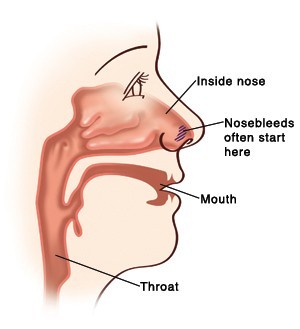
Nosebleeds, medically termed epistaxis, can be a common occurrence, especially in dry climates or during cold and flu season. While most nosebleeds are minor and resolve on their own, there are instances where they could indicate a more serious underlying issue. Understanding when to worry about nosebleeds is crucial for ensuring proper care and prompt medical attention .Nosebleeds, though often benign, can sometimes signal an underlying health concern. Knowing when to seek medical attention can alleviate anxiety and ensure timely treatment. In this comprehensive guide, we'll delve into the various causes of nosebleeds, red flags to watch out for, and practical steps to manage and prevent them effectively.
Nosebleeds, medically termed epistaxis, can be a common occurrence, especially in dry climates or during cold and flu season. While most nosebleeds are minor and resolve on their own, there are instances where they could indicate a more serious underlying issue. Understanding when to worry about nosebleeds is crucial for ensuring proper care and prompt medical attention .Nosebleeds, though often benign, can sometimes signal an underlying health concern. Knowing when to seek medical attention can alleviate anxiety and ensure timely treatment. In this comprehensive guide, we'll delve into the various causes of nosebleeds, red flags to watch out for, and practical steps to manage and prevent them effectively.
Nosebleeds occur when the delicate blood vessels in the nose rupture and bleed. They can be categorized into two types: anterior and posterior nosebleeds. Anterior nosebleeds, the most common type, originate from the blood vessels in the front part of the nose. Posterior nosebleeds, less frequent but potentially more serious, arise from the blood vessels deeper within the nose.
Nosebleeds can result from various factors, including:
While most nosebleeds are harmless and resolve spontaneously, there are instances where medical evaluation is warranted. Red flags indicating a need for medical attention include:
While nosebleeds are often harmless and can be managed at home with simple first aid measures, it's essential to recognize when they may indicate a more serious underlying issue. By understanding the common causes, red flags, and preventive measures associated with nosebleeds, individuals can take proactive steps to manage them effectively and seek medical attention when necessary.
Stress can contribute to elevated blood pressure, which may increase the likelihood of nosebleeds in susceptible individuals.
Hormonal changes and increased blood flow during pregnancy can make women more prone to nosebleeds, though they are generally harmless.
While occasional nosebleeds are common in children and often benign, frequent or severe nosebleeds may warrant evaluation by a pediatrician.
Yes, allergies that cause nasal congestion and inflammation can irritate the nasal passages and lead to nosebleeds, especially during allergy season.
Using a humidifier indoors, applying saline nasal spray, and staying hydrated can help prevent nosebleeds in dry climates.